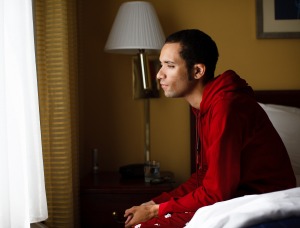Men, Migraine, and Hormones
You don’t hear about it too often – but yes, men have issues with migraine and hormones too.
Of course many women have a very clear, definite connection between their migraine attacks and their menstrual cycles. Although it’s not quite the same for men, there is growing evidence that there is an important hormonal connection.

First, some basic information. In popular culture, we often talk about “male” and “female” hormones. Estrogen, for example, is associated with women. But although estrogen levels tend to be higher in women, men have estrogen too – and it’s an important part of their biology as men.
Studies have been done on levels of “female” hormones in men, and even how this may relate to migraine. For example, a study in the journal Neurology investigated the estrogen (estradiol) / androgen (e.g. testosterone) ratio in men with migraine, finding that androgen levels were low compared to estrogen in men with migraine (see Female sex hormones in men with migraine).
A new study, published in Neurology International, focused on testosterone levels in men with migraine compared to the general population. Generally speaking, men with migraine did indeed have significantly lower testosterone levels. A large number of these had levels lower than the normal laboratory range.
Immediate questions arise – does migraine lead to low testosterone levels, or do low levels lead to migraine? Either way, there is growing interest in testosterone supplementation for men with migraine.
What are common symptoms of low testosterone? Well, erectile dysfunction is an obvious one – a condition that has links to migraine, especially for men in their 30s.
Other symptoms include:
- Lower sex drive
- Depression (strongly linked to migraine)
- Hair loss
- Trouble sleeping
- Low energy
- Increased body fat
- Poor concentration
There are good ways to increase testosterone naturally, which may help fight migraine – or the effects of migraine! Here are some quick suggestions, with links at the bottom of this article to read with more information.
- Be more active. This is not necessarily 6 days a week at the gym. Just start moving more. There are plenty of great tips out there – for migraine patients, I do recommend increasing your activity gradually, but steadily. Weight training is especially helpful.
- Watch out for processed foods, especially refined sugars and flours. There are various reasons why these foods can cause testosterone problems.
- Prioritize sleep. It may seem like a catch-22, if low testosterone makes it harder for you to sleep. Don’t be stressed if you can’t get to sleep when you want to – but do make sleep a priority in your life. Again, there are lots of great tips out there.
- Eat healthy fats and proteins. You will do this differently depending on your lifestyle, but think avocados, fish, butter, eggs, chia seeds, steaks, coconut oil, and nuts.
- Get outside in the sun. You need that vitamin D. If you’re outside for 30 minutes every day but still have low levels, consider a supplement.
Researchers aren’t sure what the connection is between migraine and testosterone in men. In this recent study, evidence was collected which suggests that testosterone, as a “neuroprotective agent”, may help fight migraine and related symptoms – which means that raising your levels may indeed decrease your migraine attacks.
And one more surprise – this may even be true for women. Granted, most women aren’t looking for huge testosterone increases. But a small therapeutic increase may help women fight migraine as well, as the researchers note.
For more, see Testosterone levels in men with chronic migraine (pdf).
More fun reads on naturally increasing your testosterone (for men):
